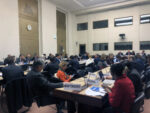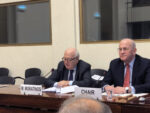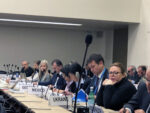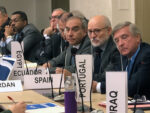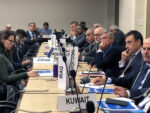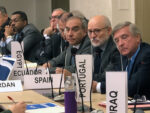Executive Briefing by Mr. Miguel Moratinos
The High Representative for UNAOC
for Member States in Geneva
Friday, 22 November 2019
Good morning and thank you very much David,
Excellencies,
Dear Colleagues,
First of all, let me express my appreciation to all of you for attending this briefing. I would also like to thank the Director-General of the United Nations Office in Geneva, Ms. Tatiana Valovaya and colleagues in her office their appreciated support in organizing this briefing.
When I first met with you on 25 March, few months after taking up my position as High Representative of the UN Alliance of Civilizations, I was able to present my initial vision for this new and exciting time for the Alliance and to benefit from your feedback and advice. Today, almost a year since I took office, I am very pleased to be able to share the work that has been accomplished since then, as well as the main highlights on the path ahead.
My presentation this morning will be structured around the main components of the quinquennial Action Plan for the UN Alliance of Civilizations covering the period 2019-2023, which was presented to members of UNAOC Group of Friends during the High-Level Ministerial level meeting that took place in New York on 27 September.
I take this opportunity to thank the co-sponsors, Spain and Turkey, for their constructive engagement leading up to Action Plan and for their staunch political and financial support to the Alliance since its inception.
I also thank members of the Group of Friends for their support to the Action Plan and constructive inputs during the Ministerial meeting in September.
As this organization approaches its 15th anniversary in 2020, UNAOC remains a viable tool for conflict prevention and conflict resolution through actions across its 4 pillars including the promotion of intercultural and interfaith dialogue. That tool had been often neglected.
At the same time given the complex nature of today’s multidimensional conflicts, I realized that there was a need to cultivate new forms of cooperation – based on genuine inclusivity – with other international and regional organizations, civil society, faith actors, municipalities, young women and men and the private sector.
I would like to recall the urgency felt when the Alliance was first created. There is a need to re-invigorate that spirit again and revamp its tools.
I have an ambitious work plan that aims at strengthening and consolidating the relevance of the work of UNAOC visa-a-vis conflict prevention and conflict resolution.
To that end, the new five-year work plan (2019-2023 ) envisages new approaches and initiatives that are measurable and results-oriented. At the same time, the plan re-enforces current project activities that have had proven impact on the ground.
The 2019-2023 Action Plan is structured around the following areas:
1. Prevention.
- The Secretary-General spelled out his vision of prevention as one of his priorities during his term in office.
- Back in 2005, the report of the High-level Group identified preventive diplomacy as an essential tool in the work of UNAOC. This means identifying and responding to the early signs of tension using all tools available. Addressing the root causes of polarization and identity-based tensions remains one of the core mandates of the work of UNAOC.
- UNAOC will continue to work on its traditional four pillars, namely, education, youth, migration and media by strengthening existing projects and adding new actions. You can find a more detailed account of all these in the Action Plan, which is available on our website, so for the purposes of this presentation, I will focus on some new actions in the pipeline:
- On youth and education, UNAOC is engaged with UNESCO and UNESCO’s Mahatma Gandhi Institute of Education for Peace and Sustainable Development in a project to train and empower youth leaders with the skills and tools to create and implement community-wide PVE activities through education. The second phase is expected to be launched in Sri Lanka before the end of this year.
- As the vice-chairs of the working group on Countering and Preventing Violent Extremism, UNAOC and UNESCO have also submitted a proposal to the UN Office of Counter-Terrorism for a project consisting in the development of innovative pedagogical tools (video-games, gamified apps, etc.) to foster intercultural and social-emotional competencies.
- On migration, In the past we have worked on the cross-sectoral pillars of media and migration. We will continue to strengthen this aspect and expand the migration portfolio. As a member of the United Nations Migration Network, UNAOC will initiate new projects/activities that aim at the integration of migrants and changing the perception about migrants in line with objectives 16 and 17 of the Global Compact on Migration.
- Last week , I had a very good meeting with my friend Antonio Vitorino, IOM DG and we agreed to capitalize on the 75th anniversary of the UN and add a new element to our flagship project Plural Plus on “young voices shaping the future” through creating a platform of an open conversation. we would like to create opportunities for multisectoral collaboration with the goal of developing and fostering innovative storytelling on migration, including through the organization of hackathons with professionals of diverse expertise (journalists, coders, designers, academics, etc.). I plan to present these new elements at the 1st Meeting of the Network on Dec 11 here in Geneva.
- On media, we plan to develop a publication with best practices implemented by members of the UNAOC Group of Friends at the national level to prevent and combat hate speech. We also plan to develop media and social media training workshops for young journalists, citizen journalists, young religious leaders and other relevant stakeholders.
- As I already mentioned to you in March, I have included a fifth pillar on women to provide a space and a voice for women as peacemakers and socio-cultural mediators. Recently, UNAOC and “Mujeres for Africa”, a foundation from Spain, established the ‘Women’s Alliance for Peace’, as a partnership to start working on projects in the field that will contribute to strengthening the role of women in mediation and peacemaking.
- Under the umbrella of prevention, sport has been added as a new action area. In this context, UNAOC will develop partnerships with sport organizations and create initiatives in which sport is used as a tool to foster social inclusion and cohesion, understanding and diversity. Already, UNAOC is engaged with UNOCT in the Global Programme on Security on major sporting events and the promotion of sport and its values as a tool to prevent violent extremism. Furthermore, in September UNAOC and Turkish Airlines signed an agreement committing to develop a new initiative entitled “Sports for Peace”.
2. Mediation.
In complementarity with mediation activities undertaken by other UN Departments, UNAOC will develop a Rapid Task Force composed of a pool of cultural and religious advocates and advisors that can be called upon to facilitate dialogue in identity-based conflict settings. UNAOC will ensure that it compliments the efforts of and is coordinated with the Department of Political and Peacebuilding Affairs and Department of Crisis Prevention and Recovery, as well as the Secretary-General’s High-level Advisory Group on Mediation and Peace-building Commission to further enhance mediation efforts. This process will be done in consultation with local, regional and international stakeholders. To that end, interacting with the Co-chairs of the United Nations Group of Friends of Mediation (Turkey & Finland) and following up the results of the Istanbul Conference on Mediation, and of the Alicante and Las Palmas International Conferences on Preventive Diplomacy in the Mediterranean and in Africa would be recommended.
- Countering and preventing violent extremism conducive to terrorism.
- Since January 2019, UNAOC has been actively engaged with the UN Office on Counter-Terrorism (UNOCT) working group on Countering and Preventing Violent Extremisms as Vice-Chair of the group with UNESCO and UNDP. There are a number of joint proposals that are being discussed to be implemented under the umbrella of UNOCT and the United Nations Counter-Terrorism Centre (UNCCT).
3. Plan of Action to safeguard religious sites.
- As you recall, in the aftermath of the attacks against mosques in Christchurch, New Zealand, last March, the Secretary-General requested me to develop a Plan of Action to safeguard religious sites. The Plan was officially launched by the Secretary-General in New York on 12 September.
- In preparations for the Plan, I engaged in an inclusive consultative process with governments, religious leaders, faith-based organizations and other relevant stakeholders to listen carefully to their ideas and inputs.
- As a result of these consultations and my own reflections, it was clear to me that the Plan had to be action-oriented document containing clear recommendations for all relevant stakeholders to work better individually and jointly in a multi-faceted approach to safeguard religious sites.
- The Plan is anchored in the Universal Declaration of Human Rights, relevant United Nations resolutions, and structured in two sections on prevention and preparedness and response, respectively:
- The section on prevention stresses the role of Member States, religious leaders, faith-based organizations, civil society, youth, women, local communities and Parliaments in the identification of vulnerabilities and potential threats to religious sites.The Plan is anchored in the Universal Declaration of Human Rights, relevant United Nations resolutions, and structured in two sections on prevention and preparedness and response, respectively:
- Religious sites are especially vulnerable to attacks due to their accessibility and the fact that there are usually limited security measures in place. Preparedness and response to possible attacks involves a thorough analysis of potential threats, risk assessments to adapt policies to the evolving nature of threats, information sharing at all level of government, as well as with religious leaders.
- The Plan will be measured by the implementation of its recommendations. I am engaged with all relevant actors to make progress on the following issues:
- Global Communication Campaign. I am engaged with relevant colleagues in the United Nations system to develop a campaign to foster mutual respect and understanding. Terrorist attacks seek to divide us. A campaign to foster unity and solidarity can be a powerful tool to counteract those messages.
- Mapping of religious sites. I am working with UNITAR/UNOSAT on a mapping of all religious sites around the world which will produce an online interactive tool to capture the universality of religious sites and contribute to fostering respect and understanding of their profound significance.
- A global conference to be convened by the UN Secretary-General in 2020 will provide an occasion to bring together the UN system, Member States, political figures, religious leaders, faith-based organizations, media and civil society to spearhead political support for specific actions to take the Plan forward.
- Last but not least, the future Global programme on the protection of vulnerable targets, including safeguarding religious sites from terrorism-related threats, which will be implemented under the leadership of the United Nations Office of Counter-Terrorism, in consultation with relevant United Nations entities, including the UN Alliance of Civilizations, will increase the ability of Member States to identify, prevent, deter, and counter threats against soft targets and increase capacity to recover from attacks, including religious sites, through the provision of expert technical assistance.
Excellencies,
Dear Colleagues,
Let me reiterate my appreciation for having the opportunity to share with you the main highlights of the different streams of work that UNAOC is developing.
I look forward to listening to your feedback and comments and count on your engagement and support in our common endeavor to continue to realize the full potential of the UN Alliance of Civilizations.
Thank you very much.
Happening now: The High-Rep @UNAOC @MiguelMoratinos remarks at the Executive Briefing at #UNOG pic.twitter.com/Z9dZOPS5No
— Nihal Saad (@nsaad777) November 22, 2019
The High-Rep @UNAOC @MiguelMoratinos briefs Member States at #UNOG about the Action Plan for UNAOC 2019-2023 & the UN Plan of Action to Safeguard Religious Sites pic.twitter.com/1qdZklWwK7
— Nihal Saad (@nsaad777) November 22, 2019
Member States at UNOG express their support to the High-Rep @UNAOC @MiguelMoratinos and UNAOC work plans pic.twitter.com/6KogUeYIL8
— Nihal Saad (@nsaad777) November 22, 2019
Member States at #UNOG had an interactive discussion with the High-Rep @UNAOC @MiguelMoratinos on UNAOC Work Plan 2019-2023 pic.twitter.com/6pWfPOPcsz
— Nihal Saad (@nsaad777) November 22, 2019
The PRs of #Iran #Ukraine #Turkey #Morocco #Egypt express support to UNAOC work plan 2019-2023 & the High-Rep priorities in the next few years pic.twitter.com/BQ0QS3FSwf
— Nihal Saad (@nsaad777) November 22, 2019
Member Sates at #UNOG engage with the High Representative @UNAOC in an interactive discussion during an Executive Briefing at UNHQ in #Geneva #miguelmorarinos pic.twitter.com/40cyN20asv
— Nihal Saad (@nsaad777) November 22, 2019
Member States @UNOG comments & questions on UNAOC work plans during an Executive Briefing #Iraq #Azerbaijan #SierraLeone #Ukraine #montenegro #Portugal #Pakistan pic.twitter.com/Adn1HMp2LI
— Nihal Saad (@nsaad777) November 22, 2019

